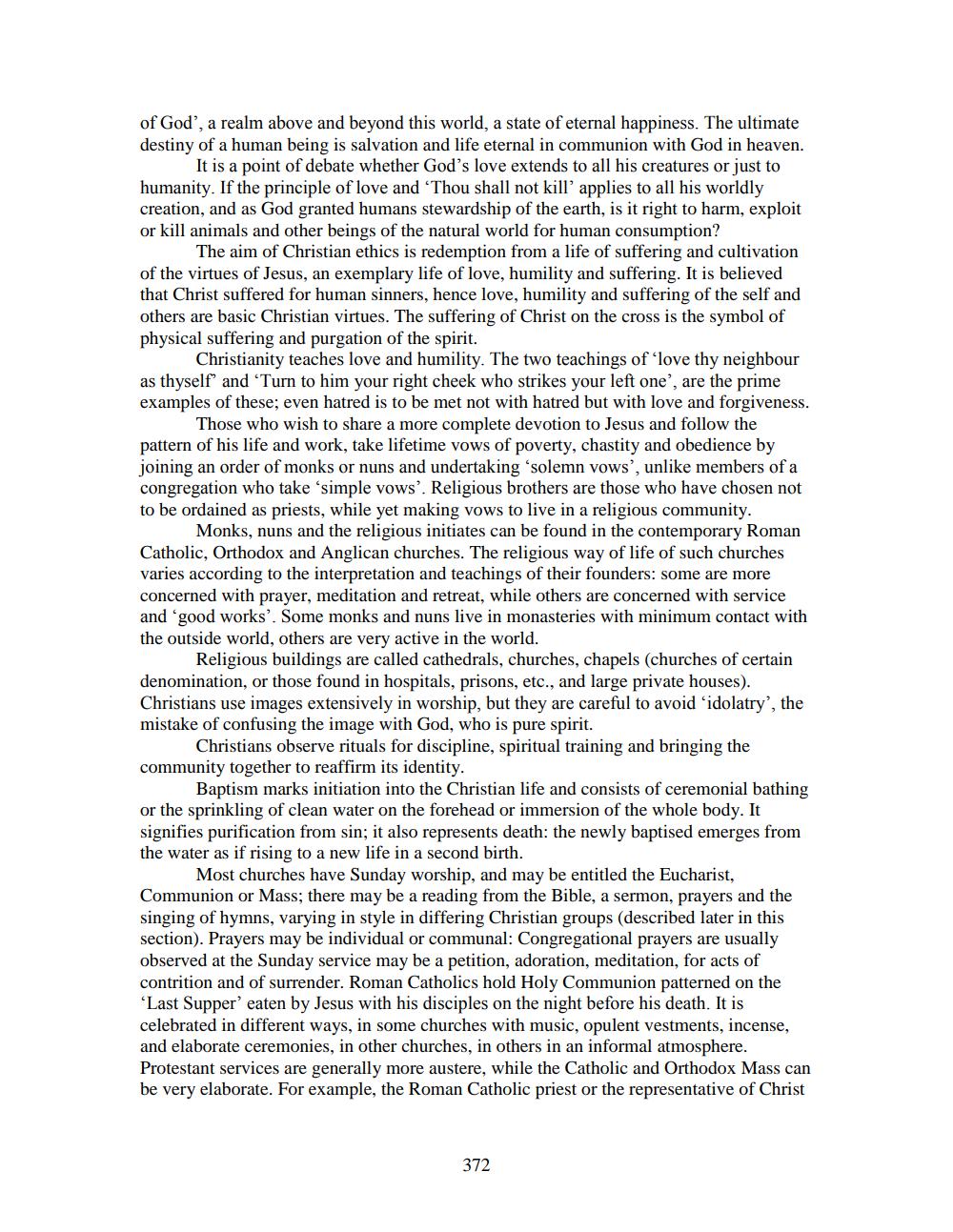________________
of God', a realm above and beyond this world, a state of eternal happiness. The ultimate destiny of a human being is salvation and life eternal in communion with God in heaven. It is a point of debate whether God's love extends to all his creatures or just to humanity. If the principle of love and "Thou shall not kill' applies to all his worldly creation, and as God granted humans stewardship of the earth, is it right to harm, exploit or kill animals and other beings of the natural world for human consumption?
The aim of Christian ethics is redemption from a life of suffering and cultivation of the virtues of Jesus, an exemplary life of love, humility and suffering. It is believed that Christ suffered for human sinners, hence love, humility and suffering of the self and others are basic Christian virtues. The suffering of Christ on the cross is the symbol of physical suffering and purgation of the spirit.
Christianity teaches love and humility. The two teachings of 'love thy neighbour as thyself' and 'Turn to him your right cheek who strikes your left one', are the prime examples of these; even hatred is to be met not with hatred but with love and forgiveness. Those who wish to share a more complete devotion to Jesus and follow the pattern of his life and work, take lifetime vows of poverty, chastity and obedience by joining an order of monks or nuns and undertaking 'solemn vows', unlike members of a congregation who take 'simple vows'. Religious brothers are those who have chosen not to be ordained as priests, while yet making vows to live in a religious community.
Monks, nuns and the religious initiates can be found in the contemporary Roman Catholic, Orthodox and Anglican churches. The religious way of life of such churches varies according to the interpretation and teachings of their founders: some are more concerned with prayer, meditation and retreat, while others are concerned with service and 'good works'. Some monks and nuns live in monasteries with minimum contact with the outside world, others are very active in the world.
Religious buildings are called cathedrals, churches, chapels (churches of certain denomination, or those found in hospitals, prisons, etc., and large private houses). Christians use images extensively in worship, but they are careful to avoid 'idolatry", the mistake of confusing the image with God, who is pure spirit.
Christians observe rituals for discipline, spiritual training and bringing the community together to reaffirm its identity.
Baptism marks initiation into the Christian life and consists of ceremonial bathing or the sprinkling of clean water on the forehead or immersion of the whole body. It signifies purification from sin; it also represents death: the newly baptised emerges from the water as if rising to a new life in a second birth.
Most churches have Sunday worship, and may be entitled the Eucharist, Communion or Mass; there may be a reading from the Bible, a sermon, prayers and the singing of hymns, varying in style in differing Christian groups (described later in this section). Prayers may be individual or communal: Congregational prayers are usually observed at the Sunday service may be a petition, adoration, meditation, for acts of contrition and of surrender. Roman Catholics hold Holy Communion patterned on the 'Last Supper' eaten by Jesus with his disciples on the night before his death. It is celebrated in different ways, in some churches with music, opulent vestments, incense, and elaborate ceremonies, in other churches, in others in an informal atmosphere. Protestant services are generally more austere, while the Catholic and Orthodox Mass can be very elaborate. For example, the Roman Catholic priest or the representative of Christ
372




